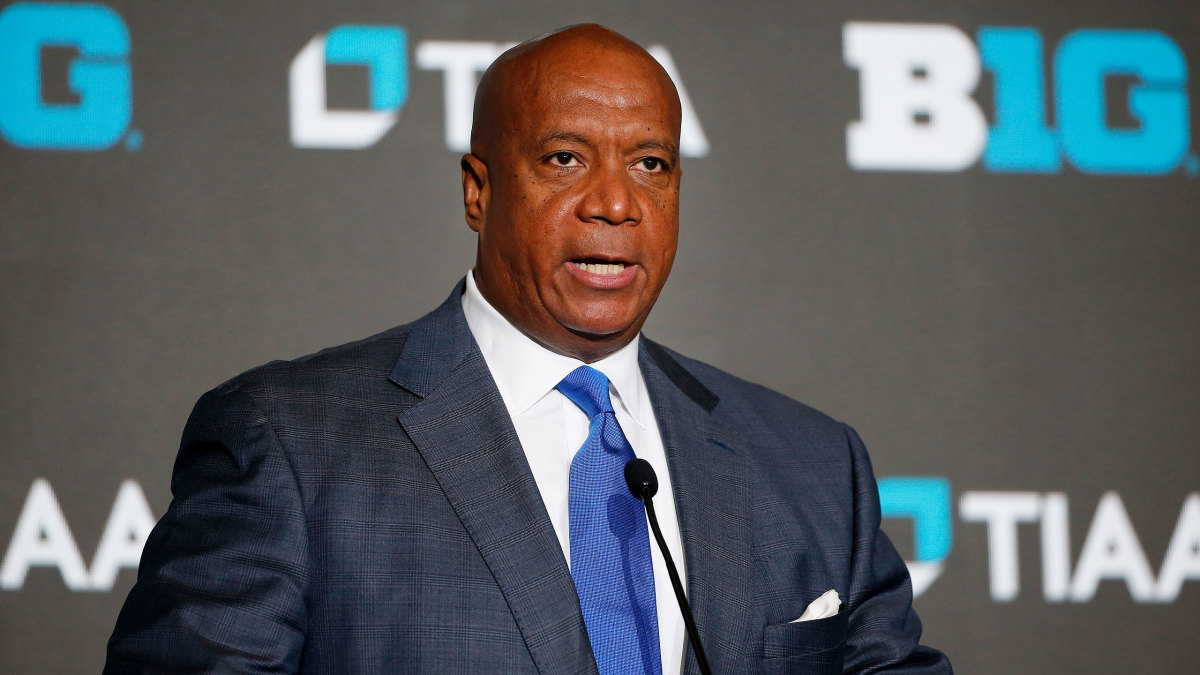Kevin Warren Says NCAA Tournament Expansion Is Something ‘We Have to Look At’
Big Ten commissioner Kevin Warren believes expanding the NCAA basketball tournaments is among the “things we have to look at.” The comments, made in a sit-down interview Wednesday from the conference’s media days in Minneapolis, are the latest in a push from leading college sports administrators to discuss expanding the field from its current 68-team format in both men’s and women’s basketball.
In August, SEC commissioner Greg Sankey told Sports Illustrated’s Pat Forde that he wants to “take a fresh look” at the tournament and cited examples of low seeds like UCLA, VCU and Syracuse that’ve made runs as a reason for an expanded postseason. Earlier Wednesday, ACC commissioner Jim Phillips said he was “in favor of looking at it” and went as far to say he “really would like us to expand.” There has even been fear from administrators at mid- and low-major schools that the tournament could change to no longer include automatic bids for all conference champions.
Warren has an interesting perspective on automatic bids. The former college basketball player at Penn and Grand Canyon played in the NCAA tournament in 1982, thanks to Penn receiving an automatic bid by winning the Ivy League. And while he is just “starting to think about these issues,” he sounded sympathetic to maintaining a similar autobid structure.
“I think there is a place in our postseason basketball to make sure that there is some equality in access and opportunity to compete for a championship,” Warren says. “Sometimes those upsets are truly what makes March Madness March Madness.”

Warren’s press conference Tuesday repeated similar refrains to the messages he shared this summer before the football season, positioning the Big Ten as an innovator that “will never follow the status quo.” When asked how that viewpoint fit in with potential changes to March Madness, one of the iconic events in U.S. sports, Warren was clearly open to change.
“I want this next year, these next couple years, to ask, Why? Why are we doing this? Why have we done this? Because so many times I’ve seen that people say, ‘Well, that’s because we’ve always done it that way,’” Warren says. “If we can provide [college athletes] with unique opportunities and experiences, be able to travel, learn, meet new people [and] compete for championships, then I’m very interested.”
The Big Ten has had a transformative year, one that featured the additions of USC and UCLA beginning with the 2024–25 season and the signing of a new TV deal that “reset the bar for what universities can make on their media rights,” as Forde wrote at the time. Warren’s tenure as commissioner has been marked by sweeping changes, from the challenges presented by the COVID-19 pandemic to major rule changes regarding NIL to realignment, TV deals and College Football Playoff expansion.
“I feel like I’m getting on dry land for once since I’ve been here,” Warren says.
The integration of USC and UCLA into the Big Ten along with its new media partners is clearly the league’s priority, and Warren tempered expectations for future conference expansion Tuesday while noting the league would always “be mindful” of it. The logistical challenges associated with adding the two West Coast schools, particularly in sports outside of football that play more regularly than once a week, are still being navigated.
“We have multiple integration committees internally that we’ve formed, and we’re starting to work on multiple ideas for scheduling,” Warren says. “What can you do from a multiteam event, what’s the location, timing, the academic component of it, the health and safety of our student-athletes, so that’s really where we’re digging in right now in the next couple of months.”
The league is also focused on preparing for its new media rights partnerships, and Warren highlighted one facet of negotiations that was non-negotiable: getting the women’s basketball Big Ten championship on linear television.
“I’m so proud that CBS stepped up to do it, and it was one of the first items even in our first meeting in regards to them being a potential partner,” Warren says. “I didn’t want this on a secondary channel. I wasn’t going to allow it. So now, knowing that going forward CBS is going to have our men’s and women’s basketball championship games on CBS is really powerful.”
It’s the latest move the conference has made to drive equity between men’s and women’s basketball, a priority of Warren’s that has become a major topic since the fallout from the 2021 “bubbled” NCAA tournaments that featured major disparities in treatment between the men’s and women’s event. The league has brought its men’s and women’s players to the same media day in the same venue in consecutive years, and Warren is even open to further moves like bringing the two conference tournaments together.
“I would love to get to the point one day where maybe we could start combining, potentially, our tournaments,” Warren says. “I don’t know if that’s feasible, there’s a lot of work to do, but I’m always thinking about how we can equalize the platform.”
Warren also pleaded once again with Congress to step in with federal legislation regarding NIL. “Hopefully there is federal legislation that happens. Hopefully they care about student-athletes and know something needs to be done. NIL has been good! It has benefited our student-athletes, but I think it could benefit them even more if there was some order and some structure to it.”
Even with things like the league’s new media rights deal and its big realignment move somewhat in the rearview mirror, Warren still finds himself and his conference at the center of a rapidly changing industry. Discussions of changing March Madness are just the latest touch point, and for once, Warren and Sankey may be on the same side.
More College Basketball Coverage:
• Report: Kentucky, Indiana in Advanced Series Talks
• AAC Rankings: It’s Houston’s League to Lose
• Five Breakthrough Men’s Team Candidates
